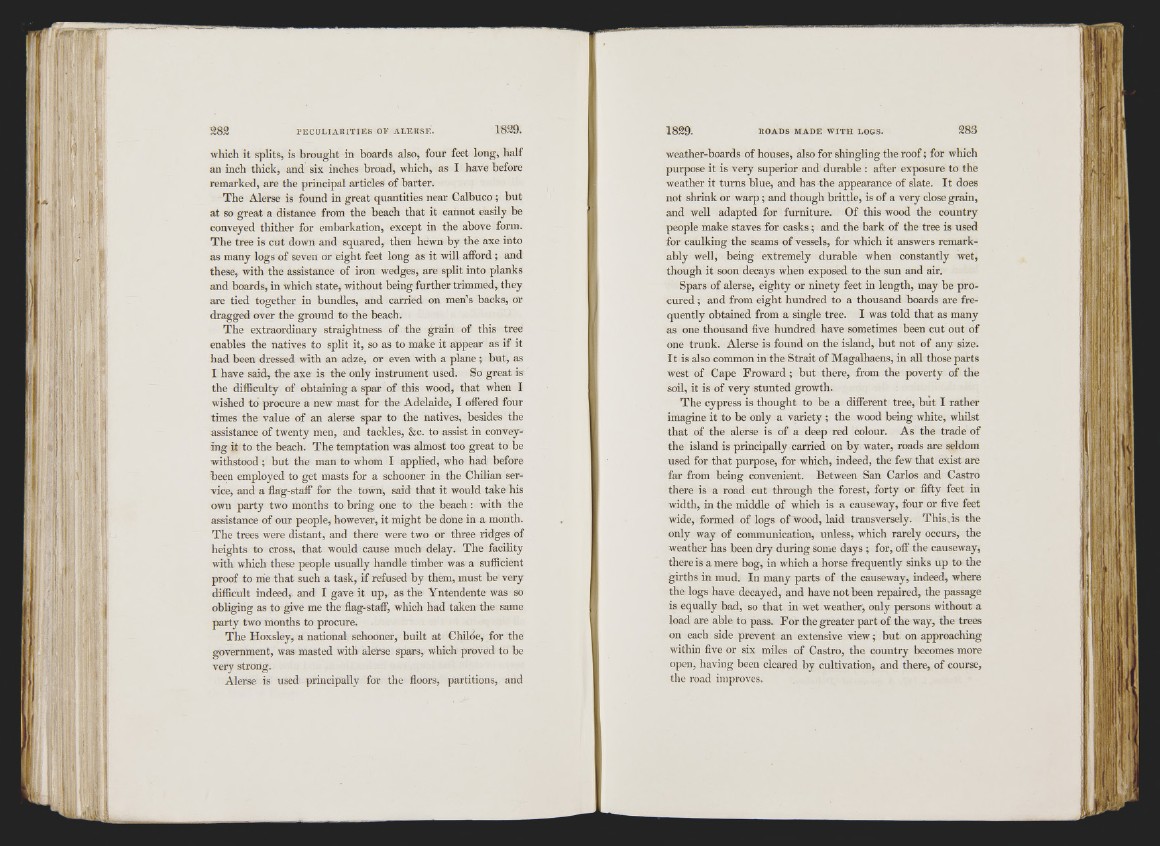
■f I
i!
which it splits, is brought in boards also, four feet long, half
an inch thick, and six inches broad, which, as I have before
remarked, are the principal articles of barter.
The Alerse is found in great quantities near Calbuco ; but
at so great a distance from the beach that it cannot easily be
conveyed thither for embarkation, except in the above form.
The tree is cut down and squared, then hewn by the axe into
as many logs of seven or eight feet long as it will afford ; and
these, with the assistance of iron wedges, are split into planks
and boards, in which state, without being further trimmed, they
are tied together in bundles, and carried on men’s backs, or
dragged over the ground to the beach.
The extraordinary straightness of the grain of this tree
enables the natives to split it, so as to make it appear as if it
had been dressed with an adze, or even with a plane ; but, as
I have said, the axe is the only instrument used. So great is
the difficulty of obtaining a spar of this wood, that when I
wished to procure a new mast for the Adelaide, I offered four
times the value of an alerse spar to the natives, besides the
assistance of twenty men, and tackles, &c. to assist in conveying
it to the beach. The temptation was almost too great to be
withstood; but the man to whom I applied, who had before
been employed to get masts for a schooner in the Chilian service,
and a flag-staff for the town, said that it would take his
own party two months to bring one to the beach; with the
assistance of our people, however, it might be done in a month.
The trees were distant, and there were two or three ridges of
heights to cross, that would cause much delay. The facility
with which these people usually handle timber was a sufficient
proof to rhe that such a task, if refused by them, must he very
difficult indeed, and I gave it up, as the Yntendente was so
obliging as to give me the flag-staff, which had taken the same
party two months to procure.
The Hoxsley, a national schooner, built at Childe, for the
government, was masted with alerse spars, which proved to be
very strong.
Alerse is used principally for the floors, partitions, and
weather-boards of houses, also for shingling the roof; for which
purpose it is very superior and durable : after exposure to the
weather it turns blue, and has the appearance of slate. It does
not shrink or warp; and though brittle, is of a very close grain,
and well adapted for furniture. Of this wood the country
people make staves for casks ; and the bark of the tree is used
for caulking the seams of vessels, for which it answers remarkably
well, being extremely durable when constantly wet,
though it soon decays when exposed to the sun and air.
Spars of alerse, eighty or ninety feet in length, may be procured
; and from eight hundred to a thousand boards are frequently
obtained from a single tree. I was told that as many
as one thousand five hundred have sometimes been cut out of
one trunk. Alerse is found on the island, but not of any size.
It is also common in the Strait of Magalhaens, in all those parts
west of Cape Froward; but there, from the poverty of the
soil, it is of very stunted growth.
The cypress is thought to be a different tree, but I rather
imagine it to be only a variety ; the wood being white, whilst
that of the alerse is of a deep red colour. As the trade of
the island is principally carried on by water, roads are seldom
used for that purpose, for which, indeed, the few that exist are
far from being convenient. Between San Carlos and Castro
there is a road cut through the forest, forty or fifty feet in
width, in the middle of which is a causeway, four or five feet
wide, formed of logs of wood, laid transversely. This is the
only way of communication, unless, which rarely occurs, the
weather has been dry during some days ; for, off the causeway,
there is a mere bog, in which a horse frequently sinks up to the
girths in mud. In many parts of the causeway, indeed, where
the logs have decayed, and have not been repaired, the passage
is equally bad, so that in wet weather, only persons without a
load ai-e able to pass. For the greater part of the way, the trees
on each side prevent an extensive view; but on approaching
within five or six miles of Castro, tho country becomes more
open, having been cleared by cultivation, and there, of course,
the road improves.
i!
yir:p
Ui..,.. II»
i l l
mI
'M
f